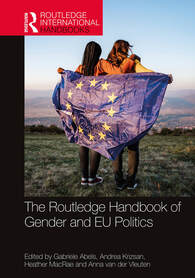I am a Professor of Comparative Politics at the University of Salzburg. My main areas of research interest include political developments in former communist countries, political institutions and their measurement, women's political representation, as well as the impact of state capacity on democratization.
I completed a Ph.D in political science at McGill University in 2008 under the supervision of Juliet Johnson, after which I was awarded a post-doctoral research fellowship from the Fond Québécois de Recherche sur la Société et la Culture, which I held at the University of Lüneburg. I also held positions as visiting chair in Comparative Government at the University of Mannheim (2010-11) and was a Senior Researcher at GESIS - Leibniz Institute for the Social Sciences (2009-2013).
Since September 2020, I am the co-lead editor of the European Journal of Politics and Gender, make sure you are following us on Twitter and keep track of all the new cool content!
I completed a Ph.D in political science at McGill University in 2008 under the supervision of Juliet Johnson, after which I was awarded a post-doctoral research fellowship from the Fond Québécois de Recherche sur la Société et la Culture, which I held at the University of Lüneburg. I also held positions as visiting chair in Comparative Government at the University of Mannheim (2010-11) and was a Senior Researcher at GESIS - Leibniz Institute for the Social Sciences (2009-2013).
Since September 2020, I am the co-lead editor of the European Journal of Politics and Gender, make sure you are following us on Twitter and keep track of all the new cool content!
**** Research news ****
April 2023:
New article on sexism and vote for radical right parties!
Read here: www.frontiersin.org/articles/10.3389/fpos.2023.1038659/abstract
November 2021:
New short commentary on the 2021 Bundestag election and the representation of women with Corinna Kröber.
Read here: www.bpb.de/apuz/343506/der-bundestag-ein-repraesentatives-parlament
April 2023:
New article on sexism and vote for radical right parties!
Read here: www.frontiersin.org/articles/10.3389/fpos.2023.1038659/abstract
November 2021:
New short commentary on the 2021 Bundestag election and the representation of women with Corinna Kröber.
Read here: www.bpb.de/apuz/343506/der-bundestag-ein-repraesentatives-parlament

****
March 2021:
Book launch of Gabriele Abels, Andrea Krizsan, Heather MacRae, Anna van der Vleuten (eds.) Routledge Handbook of Gender and EU Politics. London: Routledge. See our contribution on political knowledge about Europe here!
https://www.routledge.com/The-Routledge-Handbook-of-Gender-and-EU-Politics/Abels-Krizsan-MacRae-Vleuten/p/book/9781138485259
****
July 2020:
The European Social Survey (ESS) Wave 11 will include a rotating module entitled ‘Gender in Contemporary Europe: Rethinking Equality and the Backlash’ by Susan Banducci, Hilde Coffe, Jessica Fortin-Rittberger, Marta Fraile & Amy Alexander.
Historic moment: This will be the most comprehensive battery of items on gender ever fielded in a cross-national survey and the first ever all women team (it was about time)!
Read our position paper here!
****
July 2020:
A few thoughts on the adoption of gender quotas in Germany. Seeking to dispel the urban legend that the adoption of quotas brings lower quality politicians.
https://www.sn.at/politik/weltpolitik/was-bringt-die-frauenquote-90176881
****
June 2020:
New stuff out looking at how knowledge inequalities across gender, age, and education, are related to the content, format, and object of the survey items used to measure political knowledge. Using a pooled data set encompassing 106 post-election surveys in 47 countries from the CSES, we perform analyses by stacking the data at the question level. https://onlinelibrary.wiley.com/doi/epdf/10.1111/ssqu.12822
****
April 2019:
New article looking at the stability of different measurements of political knowledge over time and across countries! Spoiler alert: it is even less pretty than you think. https://academic.oup.com/ijpor/advance-article-abstract/doi/10.1093/ijpor/edz005/5475494
****
February 2019:
"Nur keine Angst vor der Quote" - in einem Gastbeitrag für Die Zeit.Online argumentiere ich mit Prof. Berthold Rittberger warum Frauenquoten in der Politik sinnvoll sind.
****
April 2018:
Short blog entry about our article explaining the national-local gender gap in representation in Germany in Democratic Audit!
****
February 2018: Short blog entry about your newest article tracing the limits to women's representation in Germany!
****
September 2017:
new book published! Demokratie – Ein interdisziplinäres Forschungsprojekt
Visit us at the book launch conference! 27.09.2017
****
July 2017:
The presidential power blog has published a condensed summary of a recent book chapter on presidents in post-communist countries!
****
April 2017:
Short blog entry about our newest research on electoral fraud with Philipp Harfst and Sarah Dingler on the PSA's EPOP blog, and also on the Making electoral democracy work blog!
****
March 2017:
JEPP has published a video-blog produced by Thorsten Faas, where he summarizes some of the main findings of our joint EP debate-paper (https://www.youtube.com/watch?v=EWEal2fJCBI&feature=youtu.be). The paper is also ungated until the end of March (http://www.tandfonline.com/doi/full/10.1080/13501763.2016.1268643).

